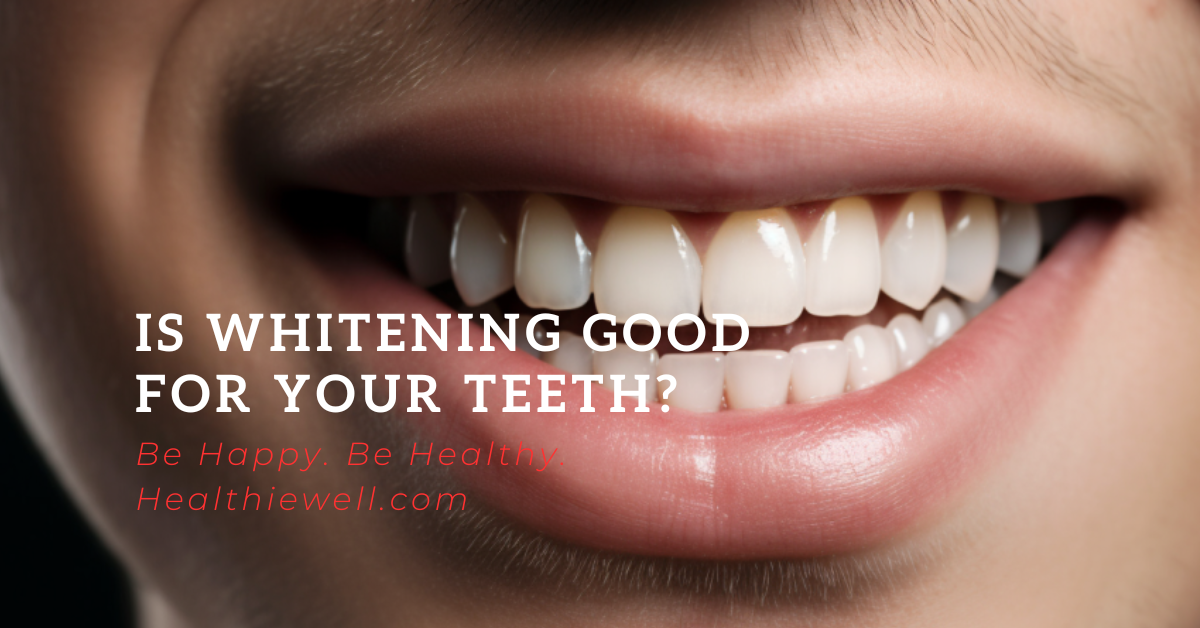When achieving a bright and white smile, many people turn to teeth whitening treatments. Whether in-office procedures or over-the-counter products, teeth whitening has become increasingly popular in recent years. But the question remains, is teeth whitening good for your teeth? Let’s explore this topic in more detail.
Read more : Why are bodyweight exercises harder than weights?
What is Teeth Whitening?
Teeth whitening is a cosmetic dental procedure that involves using products or procedures to remove stains and discoloration from teeth. The goal is to improve the appearance of teeth and create a brighter, whiter smile. Teeth can become stained or discolored for various reasons, including aging, genetics, medication use, and lifestyle factors such as tobacco use and consuming certain foods and drinks.
Types of Teeth Whitening
There are several different types of teeth whitening options available, including:
In-office whitening: This is a professional treatment done in a dental office. The dentist uses a bleaching agent to whiten teeth, which can take 30 minutes to an hour.
At-home whitening: This type of treatment involves using whitening products that can be purchased over the counter or through a dentist. At-home whitening typically consists of using a tray or strips placed on the teeth for a certain amount of time each day.
Natural remedies: Some people use natural remedies to whiten teeth, such as baking soda or hydrogen peroxide.
Are Teeth Whitening Good for Your Teeth?
The answer to this question is complex. Teeth whitening is generally considered safe when done under the supervision of a dentist or using over-the-counter products as directed. However, there are some potential risks and side effects associated with teeth whitening.
Read more : Developing grip strength with sweaty hands when doing pull-ups
One of the main risks associated with teeth whitening is tooth sensitivity. Whitening agents can cause teeth to become sensitive to hot and cold temperatures and sweet and acidic foods and drinks. This sensitivity is usually temporary and subsides after a few days or weeks.
Another potential side effect of teeth whitening is gum irritation or even burns. This can happen if the whitening agent comes into contact with the gums or soft tissues in the mouth. It’s essential to follow the instructions carefully and to use protective barriers such as dental dams to prevent this from happening.
It’s also worth noting that teeth whitening may not be effective for all types of stains or discoloration. For example, teeth that have become discolored due to medication use or certain medical conditions may not respond well to whitening treatments.
When Should You Avoid Teeth Whitening?
There are some instances where teeth whitening should be avoided or postponed. For example, if you have tooth decay or gum disease, these conditions should be treated before whitening. Whitening agents can penetrate the corrosion or infected areas and cause pain and sensitivity.
Pregnant or breastfeeding women should also avoid teeth whitening, as there is insufficient research to determine the safety of whitening products during these times.
Additionally, if you have dental restorations such as crowns or veneers, these will not respond to whitening treatments. Discussing your options with your dentist to ensure you achieve the best results possible is important.
Read more : How to Lose Weight Fast, Naturally and Permanently?
The Bottom Line
In conclusion, teeth whitening can be a good option for those who want to improve the appearance of their smile. While there are potential risks and side effects associated with teeth whitening, these can be minimized by following the instructions carefully and seeking the guidance of a dental professional. It’s also important to remember that teeth whitening may not be effective for all types of stains or discoloration.
Ultimately, the decision to whiten your teeth is a personal one that should be made after considering your individual needs and preferences. By practicing good oral hygiene habits and seeking the advice of a dental professional, you can help ensure that your teeth remain healthy and bright for years to come.

